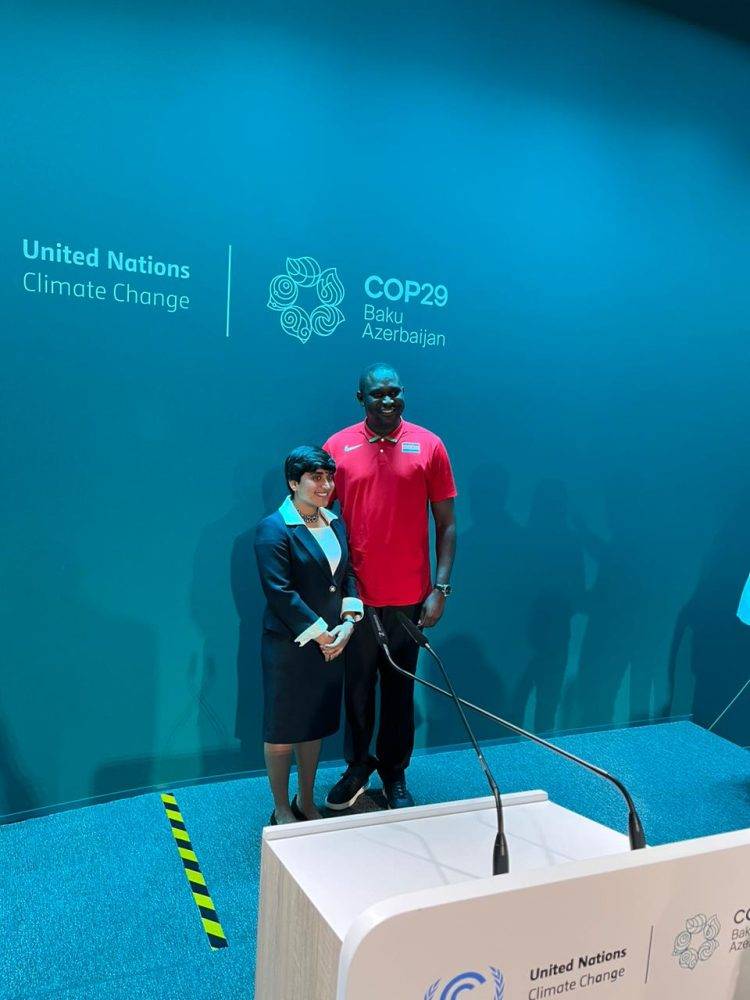Sport and climate change speakers at COP29.
Sport has the power to pull people together in the fight against the climate crisis. This was the sentiment expressed during a session on sport and climate change at the 29th United Nations Climate Change Conference (COP29) in Baku, Azerbaijan on Monday.
Former English cyclist Chris Boardman, now the chair of Sport England, noted that 65% of children in a study said they wanted sport stars to speak out about a clean, sustainable future and wanted to hear stars like footballer Harry Kane talking about climate change and the environment.
Panel members spoke about how global sporting events push up greenhouse emissions, although there are various initiatives underway to combat this.
“Around 94% of emissions from last year’s Rugby World Cup in France was from the transport,” said Olivia Wessendorff of the International Transport Forum at the Organisation for Economic Co-operation and Development.
Partnerships with public transport is one way that these emissions can be cut, she said, using the example of train travel to venues that are less than five hours away instead of using planes and buses.
This was the equivalent of “taking one million cars off the road”, Wessendorff added.
Filippo Veglio, head of social and environment sustainability at Uefa, noted that, at the Euro 2024 tournament in Germany earlier this year, “81% of fans that went to Euro games did so with public transport”.
Effect on athletes’ performance
Sport has not been spared the impact of climate change, with high temperatures, air pollution, weather events and water cleanliness posing challenges for high-performance athletes.
“Training in weather higher than 40 and reaching 50℃ is extremely dangerous to train in. Air pollution makes you feel like you have smoked cigarettes and water bodies are filled with pesticides,” decorated Indian triathlete Pragnya Mohan said.
“Climate change is pushing us athletes and global citizens to all levels.”
She was concerned that climate change would have a serious impact on sports like triathlon and that, in some disciplines, records might never be broken as athletes were stretched to their limits.
New Zealand footballer Katie Rood said 120 000 grassroot games a year were cancelled because of weather conditions.
“Sometimes we can’t train because the air quality is not good enough. Prepping for the Tokyo Olympics we trained with extreme heat challenges. There had to be ice and slush ready before games. It also means shorter warm ups from 25 to 10 minutes,” she said.
In the Pacific, wind and weather patterns make it hard to train, Samoan sailor Eroni Lelua said. “It is difficult to prepare for events when climate change makes hectic weather more frequent.”
 Pragnya Mohan and David Rudisha
Pragnya Mohan and David Rudisha
Partnering with fossil fuel groups
Delegates flagged the issue of affiliations with fossil fuel organisations. Over 130 professional women players from 26 countries with over 2 700 caps between them have come together to call for an end to Fifa’s sponsorship deal with Saudi Aramco.
“Aramco is the world’s largest state-owned oil and gas company, playing a major role in fuelling the climate crisis. The oil giant is also 98.5% owned by Saudi Arabia, who have a track record of human rights violations against women and other minorities, including the LGBTQIA+ community,” they said in a statement titled “Aramco sponsorship is a middle finger to women’s football”.
“As the largest state-owned oil and gas company in the world, Saudi Aramco is one of the corporations which is most responsible for burning football’s future. Grassroots football across the world is being smashed by extreme heat, drought, fires and floods but, as we all pay the consequences, Saudi Arabia rakes in its profits, with Fifa as its cheerleader.”
Athletes at Monday’s event said sport had the ability to inspire millions and that such partnerships showed a disregard for the people facing the dangers of climate change, many of whom are fans.
The athletes called for new partnerships to be struck, away from fossil fuels, with organisations doing environmental good.